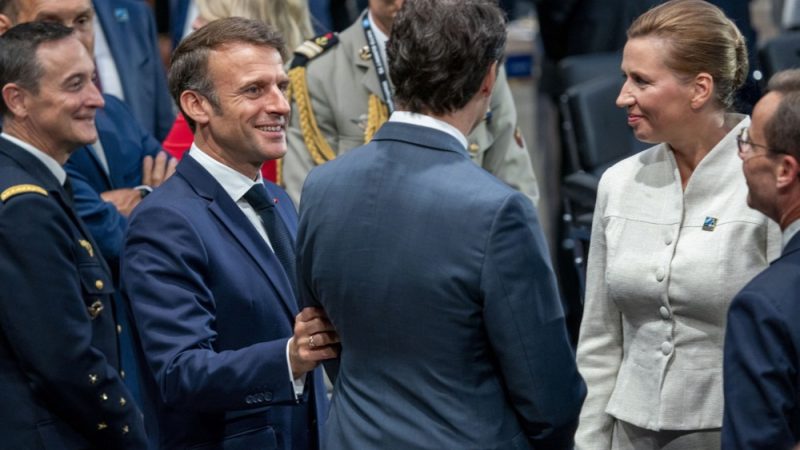With the French legislative elections having created uncertainty about the shape of the next government, President Emmanuel Macron assured NATO allies and Ukraine behind closed doors in Washington that Paris remains committed to Europe’s security.
“I confirmed to all [NATO] allies that France will keep the line in Europe, the Alliance, and in its support to Ukraine, because the political forces that constitute the majority in the National Assembly are in favour of those lines,” Macron told reporters after the summit.
“None of those that questioned those lines has a majority,” he added, in reference to the far-right Rassemblement National.
“I reassured the allies,” Macron said, on his short trip – just over 30 hours – to Washington, just two days after the results of France’s snap elections left many in doubt about Paris’ continued commitment, people familiar with the discussions said.
Macron called for early parliamentary elections in early June after the far-right Rassemblement National won three times as many seats in the European elections as his EU election list.
In the run-up to the elections, polls had predicted that the far-right would win a majority of seats in the country’s National Assembly, raising concerns that the group would be able to push for the post of prime minister.
However, with no clear majority for either Macron, the left-wing alliance or the far-right, the results have left France’s political situation in a stalemate and its allies confused about what to expect from the country’s defence and foreign policies.
Ahead of the NATO summit and a few days after the final election result, Macron wrote in a letter to the French public, where he “call[s] on all political forces that recognise themselves in republican institutions, the rule of law, parliamentarianism, a European orientation and the defence of French independence, to engage in sincere and loyal dialogue to build a solid, necessarily plural, majority for the country”.
Euractiv understands that the letter was deliberately published ahead of the NATO summit, suggesting a reassuring move that the country will not radically change its position.
‘Relief’ and reassurances
“I did not feel worry among my counterparts; I felt relief,” Macron told reporters.
“That is because they understood that the risk of seeing a political formation [arrive in France] that puts into question France’s presence in NATO’s integrated command and support to Ukraine, which would complicate [keeping] the already taken decision,” he said, talking about the Rassemblement National.
Macron, however, refused to comment on the nomination of the future prime minister, and whether they will be from the far-left France Insoumise, which is part of the left-wing coalition that gained the most seats in the snap elections.
At the international level, France is leading a coalition to procure and coordinate long-range weapons and missiles to supply Ukraine, has promised Mirage fighter jets, and has sent 2,000 troops to the Baltic and Romania to strengthen the alliance’s eastern flank.
During bilateral summit talks with his counterparts, Macron “said that France today has all the means to confirm its commitments to Ukraine and its allies,” a French diplomatic source told Euractiv.
In an official speech to his counterparts in the closed-door session, Macron “concluded by saying that the French had made the choice to exclude extremist parties that might have challenged France’s commitment to Ukraine or within the Alliance,” they added.
“France has a strong president who is acting in the international scene. I had yesterday a very good exchange with my friend Emmanuel Macron, so I’m not wondering what will happen,” German Chancellor Olaf Scholz told reporters after bilateral talks with his French counterpart on Wednesday.
“France will be on the international agenda a big partner, a strong partner of all of us, and especially a partner for Germany,” Scholz told reporters earlier this week.
In Washington, Macron met with several other NATO leaders, including newly elected Dutch Prime Minister Dirk Schoof and his British counterpart Keir Starmer.
As a sign of its commitment to increase defence production of long-range missiles and to support Ukraine, France, together with Germany, Italy and Poland, launched the European Long Range Strike Approach (ELSA) initiative to develop, produce and deliver the capabilities.
[Edited by Alexandra Brzozowski/Daniel Eck]
Read more with Euractiv
Source link : https://www.euractiv.com/section/defence-and-security/news/troubled-at-home-macron-on-reassurance-mission-at-nato-summit/
Author :
Publish date : 2024-07-11 23:08:41
Copyright for syndicated content belongs to the linked Source.
